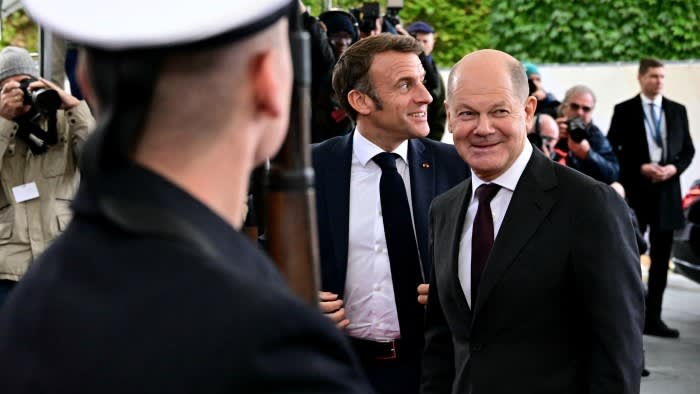Unlock the Editor’s Digest free of charge
Roula Khalaf, Editor of the FT, selects her favorite tales on this weekly publication.
The author is editorial director and a columnist at Le Monde
The chickens have come residence to roost — there’s a large gap in France’s finances. This may increasingly not come as a shock to European observers of successive French governments’ free interpretation of fiscal self-discipline. However this gap is so huge that even the French, already reeling from months of unprecedented political uncertainty, are shocked.
They’re left questioning how a fiscal deficit forecast at 4.4 per cent of GDP for this yr, which is dangerous sufficient, has all of the sudden ballooned right into a staggering 6.1 per cent. Prime Minister Michel Barnier, who leads a minority authorities after snap elections in July didn’t return a majority, now says his precedence have to be tackling the “colossal” public debt he has inherited. Barnier’s proposed finances for subsequent yr consists of €60bn of spending cuts and tax will increase. He has pleaded for leniency in Brussels and for France to be permitted, briefly, to exceed the EU’s deficit ceiling of three per cent of GDP.
President Emmanuel Macron might have one thing to say about this spectacular failure of his financial technique, as ought to Bruno Le Maire, his finance minister of seven years, now a professor at Lausanne College. Their beneficiant “no matter it prices” coverage efficiently protected the French economic system from the impression of Covid-19 and the battle in Ukraine, however the binge spending, which truly began with the gilets jaunes disaster in 2019, went on too lengthy. France is now paying larger curiosity on its five-year debt than Spain and Greece. Its credibility is on the road, on the worst attainable second for Europe.
In rosier occasions, Germany, the opposite huge energy within the EU, would have sought to rein in its French companion. Presiding over a flourishing economic system, former German chancellor Angela Merkel didn’t thoughts enjoying headteacher in the course of the sovereign debt disaster within the early 2010s. However at the moment neither her successor, Olaf Scholz, nor his finance minister, Christian Lindner, is able to patronise their French counterparts, as a lot as they could really feel the urge to. The German economic system is in recession, Scholz’s governing coalition is severely dysfunctional and the rise of extremist events is upending the nation’s political panorama.
France as the issue baby and Germany presumably as soon as extra the “sick man of Europe”? This mixture doesn’t bode properly for the continent. For all its ups and downs, the Franco-German tandem has all the time been the motive force of European integration. The engine, although, has been spluttering for the previous two years due to deep distinction precipitated partly by an absence of curiosity in Berlin, and partly by an extra of ambition on the French aspect.
The Polish election a yr in the past introduced a glimmer of hope to Paris and Berlin. With Donald Tusk, the German-speaking new prime minister and former president of the European Council, on the helm in Poland after eight years of intolerant nationalist rule, certainly Macron and Scholz may revive the so-called Weimar Triangle with Warsaw? Tusk’s centre-right authorities itself was desperate to renew ties with Berlin and Paris. Within the new strategic surroundings created by the battle in Ukraine, this regarded like the right match. Some hoped that the Weimar Triangle may compensate for the shortcomings of the Franco-German tandem. Diplomats joked that Warsaw may even assist Berlin and Paris with some {couples} remedy.
Sadly, issues took a distinct flip. Tusk’s home travails took precedence over the European name of responsibility. Confronted with a nonetheless sturdy populist, anti-German opposition, and together with his eyes on an important presidential election for his celebration subsequent yr, the Polish premier has insisted on calls for, notably concerning the legacy of the second world battle and safety points, that Scholz will not be ready to fulfill. Consequently, the Polish-German relationship is now, in its personal advanced method, even worse than Germany’s with France.
With the Franco-German engine stalled, the Weimar Triangle failing to bear fruit and Italy ruled by the nationalist proper, who will choose up the European mantle? “The fee?” a senior German official prompt, half jokingly, once I put the query to him. The fee is definitely in protected German arms with Ursula von der Leyen firmly in command in the beginning of her second time period, having evicted Thierry Breton, the brash former French commissioner. Two new commissioners from the Baltic, Kaja Kallas of Estonia and Andrius Kubilius of Lithuania, convey contemporary blood to strengthen EU overseas and defence coverage. However one other election might severely threaten this building: if Donald Trump regains the US presidency in November, Berlin, Paris and Warsaw might be properly suggested to bury their variations and work collectively, together with Brussels.


